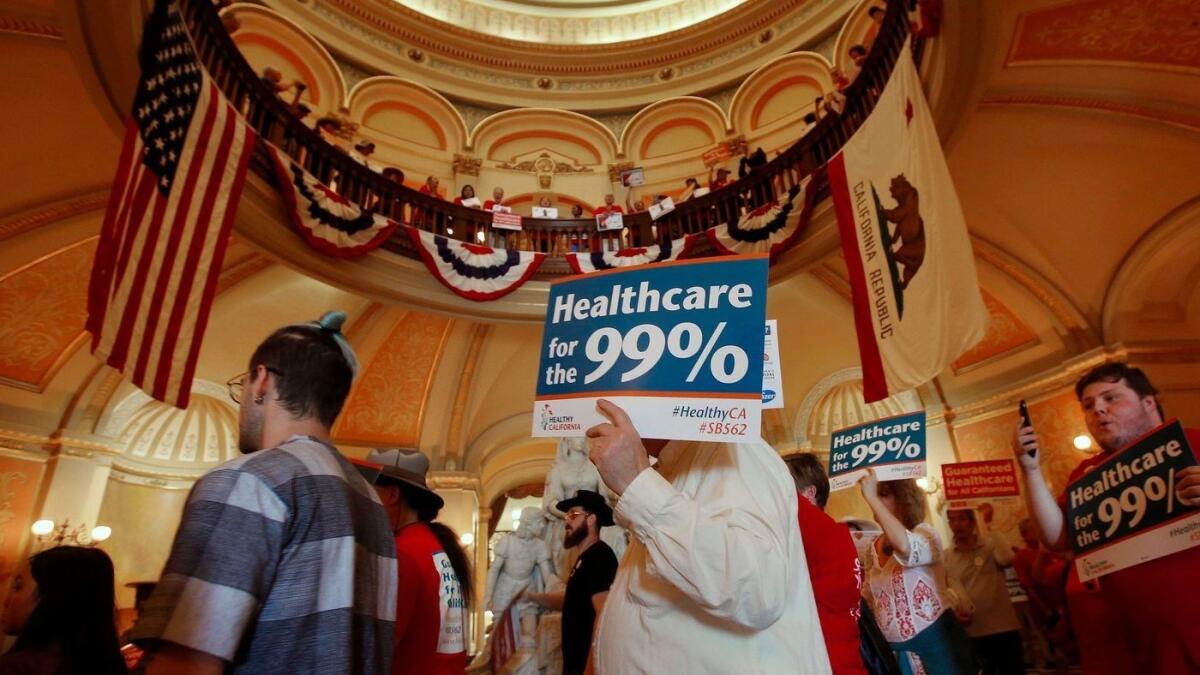Capitol Journal: Villaraigosa is right, single-payer healthcare in California is a political pipe dream

- Share via
Reporting from Sacramento — Antonio Villaraigosa thinks he has a solid weapon to hammer Lt. Gov. Gavin Newsom with as they run for governor. And he probably does.
It’s Newsom’s strong support for creating a state-run, single-payer health insurance program.
That may sound too wonky and eye-glazing for use as campaign ammunition. But it could get attention if more voters learn that the current single-payer bill pending in the Legislature would require a dramatic doubling of state taxes plus Sacramento taking over popular federal Medicare.
It also would necessitate the Trump administration and the Republican Congress cooperating with this state’s liberal leadership. The feds would need to turn over to the state all the Medicare and Medicaid money it spends in California — about $150 billion annually. Fat chance.
In all, a state-operated, single-payer healthcare plan would cost around $400 billion a year, according to objective analysis. Let’s put that in perspective: Gov. Jerry Brown’s total state spending proposal for the next fiscal year is less than half that amount — $190 billion.
So fiscally and politically, the notion of a state single-payer system is a pipe dream.
“They’re selling snake oil,” says Villaraigosa, a former Los Angeles mayor and state Assembly speaker.
Newsom, a former San Francisco mayor, calls Villaraigosa a “defeatist” who lacks political courage and bold leadership. On his campaign website, Newsom promises to “lead the way on a plan to guarantee quality healthcare for everyone financed through a single-payer model like Medicare.”
“Medicare-for-all” is a cause championed by Sen. Bernie Sanders of Vermont. It’s also a holy grail for the politically aggressive California Nurses Assn., which has endorsed Newsom.
Nationally, covering all Americans under Medicare while allowing them to buy supplemental private insurance probably makes sense. But that’s not what is being proposed in California, principally by the nurse’s union.
In fact, the legislation would eliminate Medicare for 6 million senior citizens and place them in a new state plan that covers every California resident. There’d be just one single payer for all healthcare: the state government.
Look, federal Medicare works pretty well. We don’t hear many complaints from beneficiaries. Why would anyone covered by it want the program handed over to Sacramento? And I can’t imagine the federal government agreeing to it.
Villaraigosa challenged Newsom last week to a one-on-one debate over state-run, single-payer healthcare. It’s the issue that provokes the sharpest clash between the two Democratic front-runners to replace the termed-out Brown.
We should be thankful. This is about important substance, not platitudinous fluff. And it might instruct us about how a candidate would govern — not only on this issue, but generally.
Villaraigosa is positioning himself in the race as a center-left moderate and emphasizing that the former San Francisco mayor is, well, a San Francisco liberal.
“Enough with the slogans,” Villaraigosa said. “It’s time to… have a serious in-depth discussion.”
The odds on Newsom agreeing to a debate are practically zilch. But he should. Healthcare is a topic worthy of a separate debate, not just relegated to a one-minute answer in a typical campaign forum. And, of course, the other candidates should be invited too.
Frankly, it’s hard to tell where state Treasurer John Chiang stands on the single-payer bill. The Democrat says he’s for the concept but is leery of the specific legislation. Democrat Delaine Eastin, a former state schools chief, is adamantly for the measure.
At issue is the bill, SB 562, that passed the Senate last year and soon was shelved by Assembly Speaker Anthony Rendon (D-Paramount). “Woefully incomplete,” the speaker said. The nurses’ union started trying to recall him but didn’t get far.
“Incomplete” was an understatement. The measure didn’t have a financing plan, healthcare delivery details or cost controls. But it envisioned medical coverage for everyone, including immigrant adults in the country illegally. There’d be no co-payments or deductibles.
Coverage of California politics »
It was one of the most irresponsible major bills to pass a house of the California Legislature in decades.
Most Senate Democrats voted for the bill. Four did not. All Republicans were opposed.
The measure was written by Sen. Ricardo Lara (D-Bell Gardens), who’s running for state insurance commissioner with the nurses’ backing, and incoming Senate leader Toni Atkins (D-San Diego). Atkins acknowledged recently that the bill is unlikely to be passed this year in the Assembly. It’s an election year, after all, and this bill is politically risky.
Studies by the Senate Appropriations Committee and the nonpartisan Legislative Analyst’s Office pegged the annual cost at $400 billion.
Currently, various governments kick in around $200 billion annually for healthcare in California. Of that, the feds spend $150 billion. If all that could be corralled into one Sacramento pot — extremely unlikely — the state would still need to raise another $200 billion.
Private employers could be taxed. They’d no longer have to provide workers with medical insurance. But the state still would need to raise an additional $100 billion in taxes from Californians, give or take.
Newsom continually points to a San Francisco universal healthcare program created when he was mayor as proof that he can make a single-payer plan work for all California. But equating that little San Francisco program with a massive statewide undertaking is like comparing kids’ T-ball to the major leagues.
Villaraigosa says he favors universal healthcare nationally but doesn’t have a clue how a single-payer plan could work in just one state.
“Nobody does,” he says. “That’s a fact.”
Chalk up some points for Villaraigosa.
Follow @LATimesSkelton on Twitter
More to Read
Get the L.A. Times Politics newsletter
Deeply reported insights into legislation, politics and policy from Sacramento, Washington and beyond. In your inbox twice per week.
You may occasionally receive promotional content from the Los Angeles Times.











